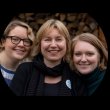Education Community

Open Science and the Science-Society Relationship
Link to the paper: https://link.springer.com/article/10.1007/s12115-019-00361-w Abstract: Nowadays, the prevailing trend in the science-society relationship is to engage with the broader public, which is beneficial for the public, scientific institutes, scientific findings, and the legitimacy of science as a whole. This article provides a broad review of the rapidly growing research...

Case Studies
Here are 3 case studies that can be used in short workshops to stimulate discussion about open science principles and practical actions. The case studies outline 3 scenarios loosely tied to aspects of open access, open data, and public engagement. The scenarios are composites of real life situations and dilemmas...

Podcasts
The podcast is hosted by Luiza Bengtsson, Emma Harris, and Zoe Ingram from the Communications department at the Max-Delbrück-Center for Molecular Medicine in the Helmholtz Association (MDC). On behalf of the ORION project, Luiza, Emma, and Zoe have been developing a whole range of training resources about Open Science for researchers, including workshops and online materials. The podcast is intended to be an easy and entertaining way to learn more about Open Science and research.
D6.2 ORION website and institutional webpages on OS
The ORION website is one of the main dissemination channels for the project and its activities. Also each participating RFPO created a dedicated webpage to Open Science and RRI on their institutional websites.
D2.2 Questionnaire for self-assessment on Open Science
In order to help other Research Funding and Performing Organizations (RFPOs) who are interested in carrying out self-assessment on Open Science, we are making the questionnaire used in the large-scale quantitative analysis available.
D2.3 Public attitudes to life sciences research in six European countries
Our survey "Public attitudes to life sciences research in six European countries" shows that interest in life sciences research is generally high among citizens and that the three most accepted purposes of using genome editing are related to the medical field. 6000 persons were interviewed in this pan-European study which...

Open Science Researcher Checklist
How can you make your science more open? The ORION training team has developed a step-by-step checklist for researchers to assess where they can make changes to open science practices in their day-to-day research.
Factsheets
15 brief, informative, and easy-to-understand one-page factsheets on Open Science topics: 1. Biohacking and DIYBio Research 2. Career Benefits of Open Science 4. Commercialisation of Research 5. Communicating Animal Research 6. Crowd Science 7. Research Data Management 8. Open Access 9. Open Research Data 10. Open Source and Software 11....

D3.1 Menu of co-creation methods
The menu of co-creation tools was designed to provide support and ideas to ORION partners and the wider community in facilitating co-creation experiments. It was developed through desk research and consultation with research funding and performing organisations already participating or hosting co-creation experiments.